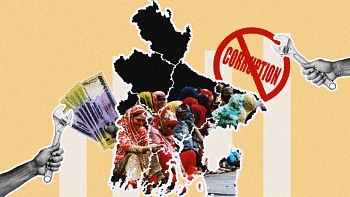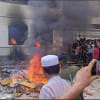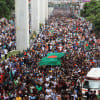Are we trying to get ‘everything, everywhere, all at once’?

The euphoria of August 5, and the momentous days leading up to it, especially since July 15, are now being overshadowed by a cloud of uncertainty. Most of us feel like we have no idea what the future holds, which direction this country is going in, or what it will mean for us individually.
Some of my friends are genuinely worried whether we are regressing towards an era of more restrictions on women—what they should wear, which spaces they are allowed to occupy, what kind of work they may be permitted to do. Truth be told, I too am concerned and dismayed. Instead of looking forward to a nation where everyone's freedom is guaranteed—regardless of religion, gender, race, ethnicity, ideology, or political affiliation—I find myself worrying whether I'll be able to express my thoughts freely without being labelled as "anti-this" or "pro-that," much like under the previous regime. I am not sure whether I can tell my daughter that the new Bangladesh, free of fear and injustice, she has been so excited about, is really on its way.
So, what is the source of this unease? Where do we begin? Is it the wave of dubious murder charges against anyone associated with the former regime, no matter how tenuous the connection, or those who have criticised the current interim government, even targeting an advocate who consistently supported the student protests? Is it because of reports of women being beaten up in public for the clothes they wear, for being unaccompanied at night? Is it because groups of students claiming to be part of the anti-discrimination student movement are going to schools, universities and government offices, forcing resignations of VCs, teachers, principals, and officers, or resorting to vandalism to demand rechecking of HSC results and to get an "auto pass?" Is it because of the overnight "takeover" of markets, bus stands, and bazaars by the new political kids in town? Is it because "fear" continues to be the weapon to bully and terrorise and force whatever outcome is desired by particular groups?
We seem to be suffering from wanting "everything, everywhere, all at once," the title of an extraordinarily long film that won many Academy Awards, where one loses track of the overload of bizarre things happening in different dimensions.
Unfortunately, current events make it difficult not to be sucked into the vortex of gloom and doom. The ridiculous pace at which things are happening, moreover, makes it impossible to write anything that is not dated. In the last 24 hours of writing this piece, a volley of disturbing events has taken place with the surety that more will follow.
It started with the president's comment that he had not actually seen the former prime minister's resignation letter in a conversation with Manab Zamin's editor which came out in the paper's weekly publication. This provoked all kinds of debate regarding whether indeed Sheikh Hasina had resigned and if not, what did it all mean. More immediately, it called to question the wisdom of the president contradicting his speech to the nation where he specifically mentioned that the prime minister had indeed resigned. Was this a faux pas or something more deliberate?
This along with comments by the law adviser questioning the mental capacity of the president as well as calls from two prominent student leaders—Sarjis Alam and Hasnat Abdullah—led to student activists congregating near the Shaheed Minar and Raju Bhashkorjo, with the anti-discrimination student movement issuing an ultimatum to the government to meet their five-point demands. They included—the removal of the president, abolishing the 1972 constitution replaced by a new one that reflected the spirit of the uprising, and "proclamation of the republic" to rebuild a post-2024 Bangladesh in consultation with democratic and functioning political parties. All this in one week or else they "will return to the streets with full force."
Meanwhile, crowds gathered near Bangabhaban, getting increasingly belligerent as police tried to prevent them from breaking through the security barriers. Despite detonating stun grenades, using tear gas, and batons, the police could not control the crowds who chased them away. Five people were injured. A few policemen were attacked and saved by journalists covering the incident. Even the army personnel present couldn't calm the crowds. It was only when Hasnat Abdullah and Sarjis Alam appealed to the protesters, promising a change "in two days," that they were convinced to leave.
These events and many more that will unfold in the days to come, indicate that we are still in a flux, a turbulence that should have been anticipated and mitigated. It is understandable that the president's latest comments and all the speculations it has given birth to would make the student protesters nervous and suspicious. But the law adviser's statements regarding the president, later endorsed by the chief adviser's office, should have been enough for them to wait for the government's decision. It was, after all, the students who invited Professor Yunus to lead the interim government and guide us towards a democratic process. Is it reasonable to expect such fundamental changes, as outlined in the five demands, to happen in just one week? The government has to be given the time and space to carry out the reforms required to ensure the basic prerequisites for the democratic process, which have been completely destroyed by the previous regime. This is why they have 10 reform commissions headed by respected citizens.
At the same time, we must all acknowledge the reality of instigators from various quarters, whether from the previous regime or other political players, to make the interim government look ineffectual so that some agenda can be served.
This makes it all the more crucial for the interim government, despite its overwhelming tasks to repair and heal a country financially crippled and institutionally made sick by a morally corrupt regime, to always be in close contact with the students and the public. Student leaders should take advantage of the access they have to a government formed on the basis of their movement and discuss their demands. At the same time, while the interim government's mandate is to fulfil the aspirations of the July-August uprising, it must also exercise its authority to prevent excesses that are reminiscent of the regime that has been ousted.
August 5 happened through a violent, abnormal sequence of events during which the government turned on its own people and used the police to brutally suppress them. The overwhelming majority of protesters were students and the general public, all coming together because of a common cause—to free themselves from 15 years of repression. But while all these people were united over their frustration and anger against a dictator and her cronies, once the common enemy was ousted, the very same comrades have become divided. Political rivalries, personal vendetta, and a sense of entitlement among various groups, started to surface, while remnants of the old regime are working to take advantage of this divisiveness.
While we may be critical of the interim government's delayed response to a series of troubling incidents, we should not be too quick to dismiss them. We must appreciate the enormity of their responsibilities. More importantly, we must not forget what happened only about three and a half months ago. Are we already forgetting the faces of those young men and women, being brutally beaten, then cold-bloodedly shot at the behest of a heartless dictator? Let us share the sorrow of the families who lost their loved ones for a movement that promised to bring freedom and justice to us. There are still thousands of people, many in the prime of youth, who are alive but have lost a limb—a leg, an arm, the ability to see again during the movement. Such tremendous sacrifice obligates all of us to be more restrained, forgiving, and patient. We have to realise the futility and dangers of wanting everything, everywhere, all at once.
Aasha Mehreen Amin is joint editor at The Daily Star.
Views expressed in this article are the author's own.
Follow The Daily Star Opinion on Facebook for the latest opinions, commentaries and analyses by experts and professionals. To contribute your article or letter to The Daily Star Opinion, see our guidelines for submission.

 For all latest news, follow The Daily Star's Google News channel.
For all latest news, follow The Daily Star's Google News channel. 












Comments